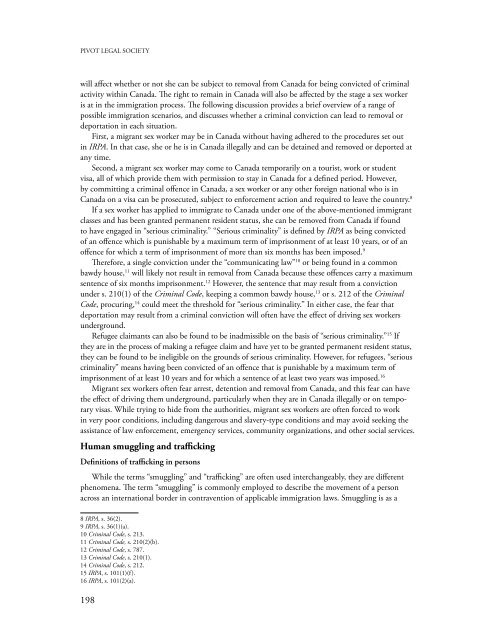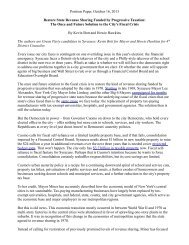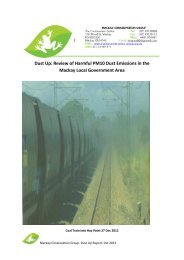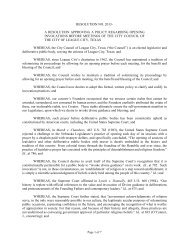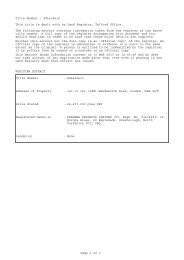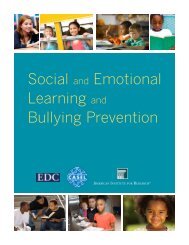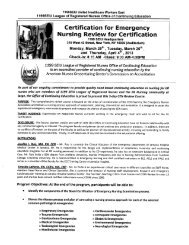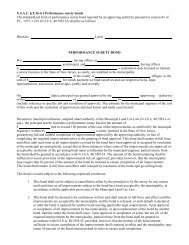PIVOT LEGAL SOCIETYwill affect whether or not she can be subject to removal from Canada for being convicted of criminalactivity within Canada. The right to remain in Canada will also be affected by the stage a sex <strong>work</strong>eris at in the immigration process. The following discussion provides a brief overview of a range ofpossible immigration scenarios, <strong>and</strong> discusses whether a criminal conviction can lead to removal ordeportation in each situation.First, a migrant sex <strong>work</strong>er may be in Canada without having adhered to the procedures set outin IRPA. In that case, she or he is in Canada illegally <strong>and</strong> can be detained <strong>and</strong> removed or deported atany time.Second, a migrant sex <strong>work</strong>er may come to Canada temporarily on a tourist, <strong>work</strong> or studentvisa, all of which provide them with permission to stay in Canada for a defined period. However,by committing a criminal offence in Canada, a sex <strong>work</strong>er or any other foreign national who is inCanada on a visa can be prosecuted, subject to enforcement action <strong>and</strong> required to leave the country. If a sex <strong>work</strong>er has applied to immigrate to Canada under one of the above-mentioned immigrantclasses <strong>and</strong> has been granted permanent resident status, she can be removed from Canada if foundto have engaged in “serious criminality.” “Serious criminality” is defined by IRPA as being convictedof an offence which is punishable by a maximum term of imprisonment of at least 10 years, or of anoffence for which a term of imprisonment of more than six months has been imposed. Therefore, a single conviction under the “communicating law” 10 or being found in a commonbawdy house, 11 will likely not result in removal from Canada because these offences carry a maximumsentence of six months imprisonment. 12 However, the sentence that may result from a convictionunder s. 210(1) of the Criminal Code, keeping a common bawdy house, 13 or s. 212 of the CriminalCode, procuring, 14 could meet the threshold for “serious criminality.” In either case, the fear thatdeportation may result from a criminal conviction will often have the effect of driving sex <strong>work</strong>ersunderground.Refugee claimants can also be found to be inadmissible on the basis of “serious criminality.” 15 Ifthey are in the process of making a refugee claim <strong>and</strong> have yet to be granted permanent resident status,they can be found to be ineligible on the grounds of serious criminality. However, for refugees, “seriouscriminality” means having been convicted of an offence that is punishable by a maximum term ofimprisonment of at least 10 years <strong>and</strong> for which a sentence of at least two years was imposed. 16Migrant sex <strong>work</strong>ers often fear arrest, detention <strong>and</strong> removal from Canada, <strong>and</strong> this fear can havethe effect of driving them underground, particularly when they are in Canada illegally or on temporaryvisas. While trying to hide from the authorities, migrant sex <strong>work</strong>ers are often forced to <strong>work</strong>in very poor conditions, including dangerous <strong>and</strong> slavery-type conditions <strong>and</strong> may avoid seeking theassistance of law enforcement, emergency services, community organizations, <strong>and</strong> other social services.<strong>Human</strong> smuggling <strong>and</strong> traffickingDefinitions of trafficking in personsWhile the terms “smuggling” <strong>and</strong> “trafficking” are often used interchangeably, they are differentphenomena. The term “smuggling” is commonly employed to describe the movement of a personacross an international border in contravention of applicable immigration laws. Smuggling is as a IRPA, s. 36(2). IRPA, s. 36(1)(a).10 Criminal Code, s. 213.11 Criminal Code, s. 210(2)(b).12 Criminal Code, s. 787.13 Criminal Code, s. 210(1).14 Criminal Code, s. 212.15 IRPA, s. 101(1)(f).16 IRPA, s. 101(2)(a).198
BEYOND DECRIMINALIZATION: <strong>Sex</strong> Work, <strong>Human</strong> <strong>Rights</strong> <strong>and</strong> a <strong>New</strong> Frame<strong>work</strong> for Law Reform“fee-for-service” operation – the business transaction <strong>and</strong> association between the parties ends at thedestination. 17In contrast, “trafficking” involves an association that continues beyond the person’s arrival at thedestination, <strong>and</strong> frequently is exploitative <strong>and</strong> violent. In some cases, smuggling turns into trafficking.18 Trafficking does not necessarily contravene immigration laws; trafficking can occur in thecontext of legal entry into a receiving or transit state. Unlike smuggling, the movement of a personto a different location is not what constitutes trafficking, rather it is the deception, coercion or forceexercised on a person to become or remain in servitude that defines trafficking. 19The key components of trafficking include the use of some form of deception, coercion or forcein order to exploit the trafficked person upon their arrival at the destination. Usually, the traffickedperson is subject to either sexual exploitation or forced labour. Most cases of trafficking investigatedby the Canadian law enforcement involve individuals engaged in the sex industry. 20Canada is a known to be a country of transit <strong>and</strong> destination for trafficked persons. Internal traffickingof both Canadians <strong>and</strong> non-Canadians takes place throughout the country. For example, lawenforcement agencies are aware that some organized crime groups engage in the trafficking of persons,both Canadians <strong>and</strong> non-Canadians, among provinces for the purposes of prostitution <strong>and</strong> otheractivities. 21Trafficking in persons is described as a modern-day form of slavery involving victims who are typicallyforced, defrauded or coerced into sexual or labour exploitation. Some agencies <strong>and</strong> organizationsargue that it is among the fastest growing criminal activities, occurring both worldwide <strong>and</strong> in individualcountries. 22 A UN Protocol to Prevent, Suppress <strong>and</strong> Punish Trafficking in Persons, EspeciallyWomen <strong>and</strong> Children defines trafficking in persons as:the recruitment, transportation, transfer, harbouring or receipt of persons, by means of thethreat or use of force or other forms of coercion, of abduction, of fraud, of deception, of theabuse of power or of a position of vulnerability or of the giving or receiving of payments orbenefits to achieve the consent of a person having control over another person, for the purposeof exploitation. Exploitation shall include, at a minimum, the exploitation of the prostitutionof others or other forms of sexual exploitation, forced labour or services, slavery or practicessimilar to slavery, servitude or the removal of organs. 23Consent of a person to exploitation is irrelevant if there has been any coercion or deception involved. 24StatisticsEach year, it is estimated that anywhere between 700,000 to four million persons are traffickedglobally. 25 Approximately 80 percent of global trafficking victims are female, 70 percent of whom aretrafficked in the commercial sex industry. 26 The Royal Canadian Mounted Police (RCMP) estimatesthat 800 persons are trafficked into Canada per year. However, some non-governmental organizations17 RCMP, “Project Surrender: A strategic intelligence assessment of the extent of human trafficking to Canada,” 30 Jan 2004 at 18.18 Ibid. at 6.19 Office to Monitor <strong>and</strong> Combat Trafficking in Persons , “Trafficking in Persons Report” 3 June 2005 (U.S. Department of State) at10, online: .20 Supra note 17 at 8.21 Protection Project, The, “2005 <strong>Human</strong> <strong>Rights</strong> Report on Trafficking in Persons, Especially Women <strong>and</strong> Children,” 2005 at 1,online: .22 Supra note 19 at introduction.23 Protocol to Prevent, Suppress <strong>and</strong> Punish Trafficking in Persons, Especially Women <strong>and</strong> Children, Supplementing the United NationsConvention Against Transnational Organized Crime, United Nations, 2000, Article 3(a).24 Ibid. at Article 3(b).25 Supra note 17 at 5.26 International Rescue Committee, Trafficking Watch, Issue No. 5, Summer 2004 at 9.199
- Page 4:
PIVOT LEGAL SOCIETYPart 2: Municipa
- Page 21 and 22:
BEYOND DECRIMINALIZATION: Sex Work,
- Page 23 and 24:
BEYOND DECRIMINALIZATION: Sex Work,
- Page 25 and 26:
BEYOND DECRIMINALIZATION: Sex Work,
- Page 27 and 28:
BEYOND DECRIMINALIZATION: Sex Work,
- Page 29 and 30:
BEYOND DECRIMINALIZATION: Sex Work,
- Page 31 and 32:
BEYOND DECRIMINALIZATION: Sex Work,
- Page 33 and 34:
BEYOND DECRIMINALIZATION: Sex Work,
- Page 35 and 36:
BEYOND DECRIMINALIZATION: Sex Work,
- Page 37 and 38:
BEYOND DECRIMINALIZATION: Sex Work,
- Page 39 and 40:
BEYOND DECRIMINALIZATION: Sex Work,
- Page 41 and 42:
BEYOND DECRIMINALIZATION: Sex Work,
- Page 43 and 44:
BEYOND DECRIMINALIZATION: Sex Work,
- Page 45 and 46:
BEYOND DECRIMINALIZATION: Sex Work,
- Page 47 and 48:
BEYOND DECRIMINALIZATION: Sex Work,
- Page 49 and 50:
BEYOND DECRIMINALIZATION: Sex Work,
- Page 51 and 52:
BEYOND DECRIMINALIZATION: Sex Work,
- Page 53 and 54:
BEYOND DECRIMINALIZATION: Sex Work,
- Page 55 and 56:
BEYOND DECRIMINALIZATION: Sex Work,
- Page 57 and 58:
BEYOND DECRIMINALIZATION: Sex Work,
- Page 59 and 60:
BEYOND DECRIMINALIZATION: Sex Work,
- Page 61 and 62:
BEYOND DECRIMINALIZATION: Sex Work,
- Page 63 and 64:
BEYOND DECRIMINALIZATION: Sex Work,
- Page 65 and 66:
BEYOND DECRIMINALIZATION: Sex Work,
- Page 67 and 68:
BEYOND DECRIMINALIZATION: Sex Work,
- Page 69 and 70:
BEYOND DECRIMINALIZATION: Sex Work,
- Page 71 and 72:
BEYOND DECRIMINALIZATION: Sex Work,
- Page 73 and 74:
BEYOND DECRIMINALIZATION: Sex Work,
- Page 75 and 76:
BEYOND DECRIMINALIZATION: Sex Work,
- Page 77 and 78:
BEYOND DECRIMINALIZATION: Sex Work,
- Page 79 and 80:
BEYOND DECRIMINALIZATION: Sex Work,
- Page 81 and 82:
BEYOND DECRIMINALIZATION: Sex Work,
- Page 83 and 84:
BEYOND DECRIMINALIZATION: Sex Work,
- Page 85 and 86:
BEYOND DECRIMINALIZATION: Sex Work,
- Page 87 and 88:
BEYOND DECRIMINALIZATION: Sex Work,
- Page 89 and 90:
BEYOND DECRIMINALIZATION: Sex Work,
- Page 91 and 92:
BEYOND DECRIMINALIZATION: Sex Work,
- Page 93 and 94:
BEYOND DECRIMINALIZATION: Sex Work,
- Page 95 and 96:
BEYOND DECRIMINALIZATION: Sex Work,
- Page 97 and 98:
BEYOND DECRIMINALIZATION: Sex Work,
- Page 99 and 100:
BEYOND DECRIMINALIZATION: Sex Work,
- Page 101 and 102:
BEYOND DECRIMINALIZATION: Sex Work,
- Page 103 and 104:
BEYOND DECRIMINALIZATION: Sex Work,
- Page 105 and 106:
BEYOND DECRIMINALIZATION: Sex Work,
- Page 107 and 108:
BEYOND DECRIMINALIZATION: Sex Work,
- Page 109 and 110:
BEYOND DECRIMINALIZATION: Sex Work,
- Page 111 and 112:
BEYOND DECRIMINALIZATION: Sex Work,
- Page 113 and 114:
BEYOND DECRIMINALIZATION: Sex Work,
- Page 115 and 116:
BEYOND DECRIMINALIZATION: Sex Work,
- Page 117 and 118:
BEYOND DECRIMINALIZATION: Sex Work,
- Page 119 and 120:
BEYOND DECRIMINALIZATION: Sex Work,
- Page 121 and 122:
BEYOND DECRIMINALIZATION: Sex Work,
- Page 123 and 124:
BEYOND DECRIMINALIZATION: Sex Work,
- Page 125 and 126:
BEYOND DECRIMINALIZATION: Sex Work,
- Page 127 and 128:
BEYOND DECRIMINALIZATION: Sex Work,
- Page 129 and 130:
BEYOND DECRIMINALIZATION: Sex Work,
- Page 131 and 132:
BEYOND DECRIMINALIZATION: Sex Work,
- Page 133 and 134:
BEYOND DECRIMINALIZATION: Sex Work,
- Page 135 and 136:
BEYOND DECRIMINALIZATION: Sex Work,
- Page 137 and 138:
BEYOND DECRIMINALIZATION: Sex Work,
- Page 139 and 140:
BEYOND DECRIMINALIZATION: Sex Work,
- Page 141 and 142:
BEYOND DECRIMINALIZATION: Sex Work,
- Page 143 and 144:
BEYOND DECRIMINALIZATION: Sex Work,
- Page 145 and 146:
BEYOND DECRIMINALIZATION: Sex Work,
- Page 147 and 148: BEYOND DECRIMINALIZATION: Sex Work,
- Page 149 and 150: BEYOND DECRIMINALIZATION: Sex Work,
- Page 151 and 152: BEYOND DECRIMINALIZATION: Sex Work,
- Page 153 and 154: BEYOND DECRIMINALIZATION: Sex Work,
- Page 155 and 156: BEYOND DECRIMINALIZATION: Sex Work,
- Page 157 and 158: BEYOND DECRIMINALIZATION: Sex Work,
- Page 159 and 160: BEYOND DECRIMINALIZATION: Sex Work,
- Page 161 and 162: BEYOND DECRIMINALIZATION: Sex Work,
- Page 163 and 164: BEYOND DECRIMINALIZATION: Sex Work,
- Page 165 and 166: BEYOND DECRIMINALIZATION: Sex Work,
- Page 167 and 168: BEYOND DECRIMINALIZATION: Sex Work,
- Page 169 and 170: BEYOND DECRIMINALIZATION: Sex Work,
- Page 171 and 172: BEYOND DECRIMINALIZATION: Sex Work,
- Page 173 and 174: BEYOND DECRIMINALIZATION: Sex Work,
- Page 175 and 176: BEYOND DECRIMINALIZATION: Sex Work,
- Page 177 and 178: BEYOND DECRIMINALIZATION: Sex Work,
- Page 179 and 180: BEYOND DECRIMINALIZATION: Sex Work,
- Page 181 and 182: BEYOND DECRIMINALIZATION: Sex Work,
- Page 183 and 184: BEYOND DECRIMINALIZATION: Sex Work,
- Page 185 and 186: BEYOND DECRIMINALIZATION: Sex Work,
- Page 187 and 188: BEYOND DECRIMINALIZATION: Sex Work,
- Page 189 and 190: BEYOND DECRIMINALIZATION: Sex Work,
- Page 191 and 192: BEYOND DECRIMINALIZATION: Sex Work,
- Page 193 and 194: BEYOND DECRIMINALIZATION: Sex Work,
- Page 195 and 196: BEYOND DECRIMINALIZATION: Sex Work,
- Page 197: BEYOND DECRIMINALIZATION: Sex Work,
- Page 201 and 202: BEYOND DECRIMINALIZATION: Sex Work,
- Page 203 and 204: BEYOND DECRIMINALIZATION: Sex Work,
- Page 205 and 206: BEYOND DECRIMINALIZATION: Sex Work,
- Page 207 and 208: BEYOND DECRIMINALIZATION: Sex Work,
- Page 209 and 210: BEYOND DECRIMINALIZATION: Sex Work,
- Page 211 and 212: BEYOND DECRIMINALIZATION: Sex Work,
- Page 213 and 214: BEYOND DECRIMINALIZATION: Sex Work,
- Page 215 and 216: BEYOND DECRIMINALIZATION: Sex Work,
- Page 217 and 218: BEYOND DECRIMINALIZATION: Sex Work,
- Page 219 and 220: BEYOND DECRIMINALIZATION: Sex Work,
- Page 221 and 222: BEYOND DECRIMINALIZATION: Sex Work,
- Page 223 and 224: BEYOND DECRIMINALIZATION: Sex Work,
- Page 225 and 226: BEYOND DECRIMINALIZATION: Sex Work,
- Page 227 and 228: BEYOND DECRIMINALIZATION: Sex Work,
- Page 229: BEYOND DECRIMINALIZATION: Sex Work,


